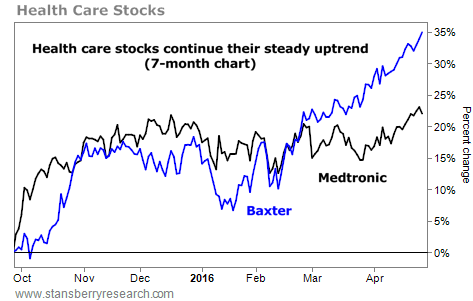| Home | About Us | Resources | Archive | Free Reports | Market Window |
Venezuela Doesn't Have Enough Money... To PRINT MONEYBy
Thursday, April 28, 2016
You know the old joke about the worthless currency, right?
"The guy with the wheelbarrow full of money was robbed. They stole the wheelbarrow and left the money..."
Unfortunately, that's the type of thing that's happening in Venezuela today – only the story gets much worse...
I saw this type of thing firsthand when I visited Venezuela years ago...
I went to a bank in the middle of nowhere (Coro) to take out some cash.
It looked like a bus station. There was a long line, and everyone was carrying a duffel bag. I'd never seen anything like it.
It turned out, those duffel bags were full of cash... worthless cash. The duffel bags themselves were worth more than what was in them.
Today, the situation in Venezuela is much worse than when I was there.
Venezuela's currency is worthless... If you trade one U.S. penny for 10 Venezuelan bolivars, you're getting the worse end of the deal.
Specifically, right now, one U.S. dollar will get you 1,100 bolivars. (Tomorrow, it might be closer to 1,200 bolivars.)
So if you want to deposit $500 U.S. dollars into the bank today, then you will need 550,000 bolivars.
Amazingly, Venezuela's largest bill is 100 bolivars – which is less than $0.10 in the U.S.
You would need 5,500 of Venezuela's largest bills to deposit the equivalent of $500 U.S. dollars in the bank (hence the duffel bags). That's why the lines are so long – because the banks have to count all those bills.
Because Venezuela's largest bill is only worth less than $0.10 in the U.S., Venezuela has to print A LOT of bills. And this is where things get REALLY crazy...
Yesterday, Bloomberg reported that Venezuela is "now so broke that it may not have enough money to pay for its money." (The story is fantastic. You can read it here.)
At this point, the international companies that print money are tired of printing money for Venezuela... They either aren't getting paid on time, or aren't getting paid at all.
The money-printer has a dilemma with Venezuela: It's an order big enough to fill your factory for a year, but do you want to completely expose yourself to a country as risky as Venezuela?
And it's not just the currency...
Just yesterday, Venezuela announced a two-day workweek for government employees. You start work on Monday, and the weekend starts at the close of business on Tuesday.
Why? Despite the fact that Venezuela has the world's largest proven oil reserves, its government has to ration out energy.
This is a disaster... and it was all avoidable. I lay the blame squarely on Venezuela's government – mainly on the socialist rule of President Hugo Chavez from 2002 to 2013. This placed all the power in the hands of the government, and none in the hands of the people. And look what happened.
People think things like this don't happen in this day and age anymore... but they do.
People also think that things like this can't happen here... but they can.
The best thing you and I can do to avoid ever being in this situation is to do our best to limit the powers of the government...
Good investing,
Steve
Further Reading:
While things look dire in Venezuela, Steve recently wrote about an opportunity in a different, thriving country. History shows that this country's stock market "averages 27% gains over the next year, and 53% gains over the next two years," he writes. Read more here.
Steve also highlighted a rare extreme that points to big, quick gains in European stocks. See what he's keeping an eye on here: Double-Digit Gains, Starting Soon, in European Stocks.
Market NotesHEALTH CARE STOCKS HIT ALL-TIME HIGHS The aging U.S. population is leading health care stocks to new highs...
For many years, our colleague David Eifrig has told his readers to invest in the health care sector. His thesis is simple: He believes the money spent for treatment will continue to grow as Baby Boomers get older.
Lately, two health care companies have been in steady uptrends: Medtronic (MDT) and Baxter International (BAX). Medtronic is the world's largest maker of medical devices like insulin pumps and pacemakers. Baxter makes systems for treating patients with a range of conditions, including hemophilia and kidney disease.
As you can see in the chart below, shares of Medtronic (black line) and Baxter (blue line) are up 22% and 35%, respectively, since late September. It's even more proof that Doc's health care thesis is spot on.
 |
Recent Articles
|



